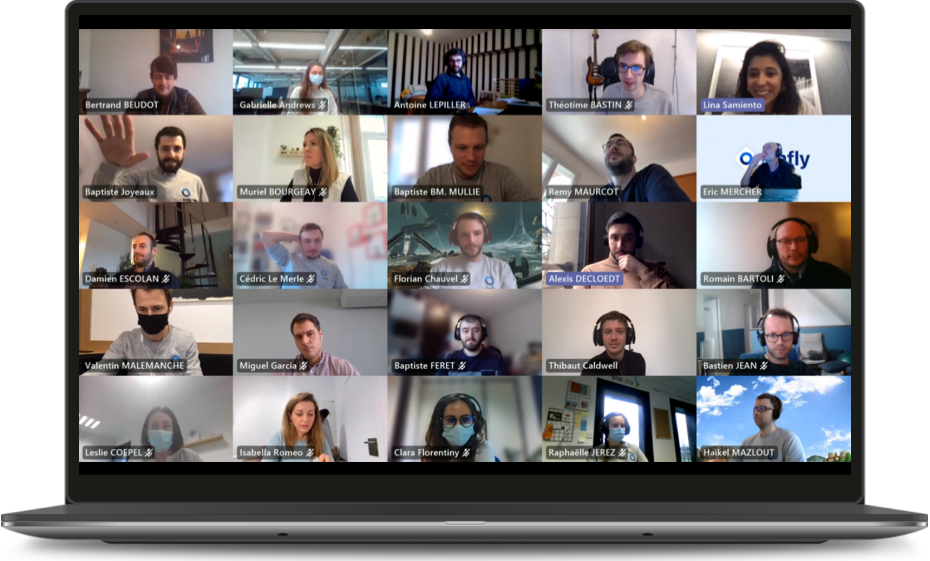A whole day without a meeting or without having a colleague on the phone can seem crazy nowadays. But it might be something we need since we mainly work from home. Remote working increases the number of meetings and interactions per day. Productivity and mental health suffer when we are constantly interrupted. Frustration appears when we feel we haven’t fully completed any task at the end of the day or that we have little time to move forward on projects.
Remote work was exhausting for BIMers.
On average, a person who is in the middle of a creative or technical activity takes 23 minutes to get back to the same level of concentration as before the interruption, explains Paul Graham, co-founder of Y Combinator. The delay accumulated during the day due to the increase of interruptions had an impact on the extension of working hours, and also stress linked to the feeling of being swamped. Everyone wanted to make up for the time spent in meetings.
The second source of fatigue that teams shared with us was the feeling of being constantly observed. In an office meeting environment, you rarely look at the attendees during the entire meeting. Usually, you take notes, look at the person next to you, stare at the plant in the back of the room. When someone’s face is very close to ours in real life, our brain interprets it as an intense situation that will lead us to mate or conflict. “What happens when you use Zoom for many hours is that you’re in this hyper-excited state all the time‘‘, according to Jeremy Bailenson, professor of communication and founding director of the Stanford Virtual Human Interaction Lab (VHIL).
Grueling schedule!
9:00 am, some coffee, laptop opened, headphones on, ready for the back-to-back meeting marathon. To compensate for the fact that we no longer bump into each other during coffee breaks, or that we could hear about a changing plan on our team over our desk, we started booking more and more meetings and calls to be updated. Not only did we spend a lot of time repeating the same information to different people, but some of the information shared was incomplete.
Three points of friction emerged, which we had to resolve quickly and which we are still working on:
- We were not documenting our processes, our meetings, our decisions, enough.
- We were trying to reproduce a face-to-face way of working at home.
- We didn’t know how to run meetings efficiently.
For Lise, our DevOps, having too many meetings during the week left little time to work on substantive tasks because she was constantly on a call. On Wednesdays she can now “focus on building tasks – new things, or big improvements; as well as tasks that require a lot of focus, including research”.
For Baptiste, COO, too many meetings lead to a “lack of focus,” leading to low productivity and performance. No-meeting Wednesdays allow him to concentrate better: “I have more space to deal with fundamental questions without distraction“. This allows him to take a step back on the company’s offer and strategy.
low productivity and performance. No-meeting Wednesdays allow him to concentrate better: “I have more space to deal with fundamental questions without distraction“. This allows him to take a step back on the company’s offer and strategy.
No more meetings on Wednesdays at BIM&CO!
This day has become an opportunity to complete tasks that have been on the “To-do list” for too long, and that did not progress due to lack of time. Having a whole day per week, dedicated to the development and pushing through our “big rocks“, allows us to focus our efforts on strategic objectives and not only manage emergencies.
The idea was also to reduce meeting time and eliminate the ones that had no impact. According to Atlassian, a dedicated meeting time during the week helps 73% of people who do other things during meetings and 91% who daydream.

This is what we did to launch the initiative, here are some tips to help you if you feel like trying it!
- We read a lot about it and we tried to adapt the concept to our team’s mindset and our business needs.
- We communicated to the whole team the objective behind this initiative, which is mainly to give them more time to achieve their missions. Our leads promoted the initiative to their teams and canceled all the meetings they had on Wednesdays.
- Be mindful of others’ time, when you have meetings the rest of the week: Provide a clear agenda and monitor timekeeping. Before you invite someone to a meeting, ask yourself if you really need them there. Also, ask yourself if these meetings need to happen every single week, if there is nothing to say since the last meeting.
We are still figuring it out, so if you want to share something with us let us know!

